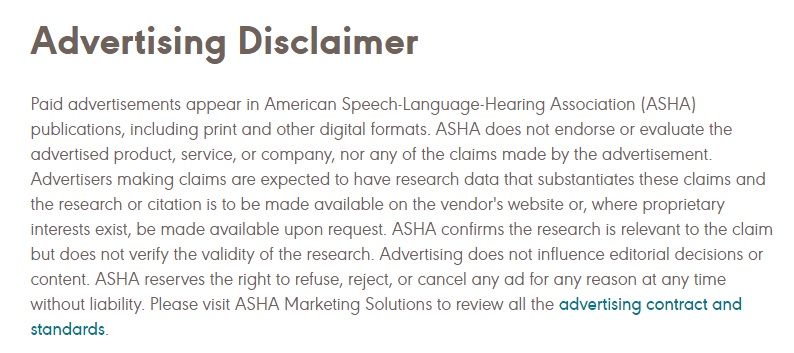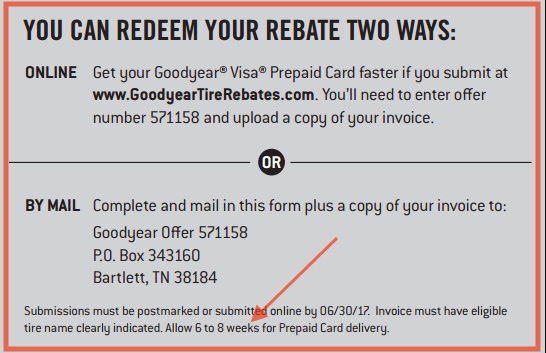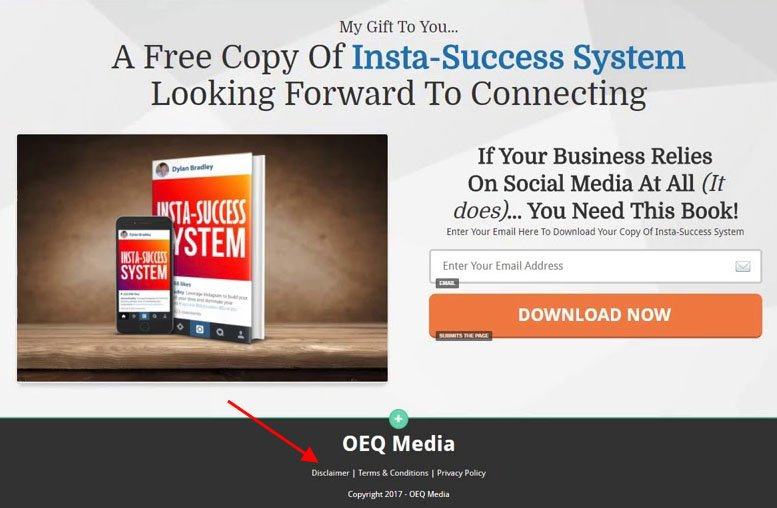How Do Advertising Disclaimers Affect Your Business?
Whether you run a blog, a magazine, or a business that you advertise, you need to know the ins and outs of advertising disclaimers.If you don't, you could wind up with some seriously upset customers and even some legal troubles.
But before we dive into the details, let's start by talking about disclaimers themselves.
A disclaimer is a statement designed to limit legal liability.
For example, if you order something on a British website that promises two-day shipping, you may see a disclaimer in the fine print that says "Two-day shipping only applies to UK residents."
In other words, if you need the product shipped all the way to Los Angeles, it's not going to arrive in two days. When it doesn't, you can't take action against the seller because they told you upfront that the shipping deal only applies to people who live in the UK in their disclaimer.
So what does that have to do with advertising?
Advertising disclaimers help give potential customers the full story about a product or service.
For example, if you see a commercial for a weight loss supplement, take a close look at the bottom of your TV screen. Odds are you'll see something like, "When used in conjunction with a healthy diet and regular exercise."
In other words, this isn't some kind of magical wonder weight loss drug. Sure, it may help you shed some pounds, but in order to see the best results, you'll have to eat better and spend some time burning off calories at the gym.
Another advertising disclaimer you're most likely to see is one that talks about averages, like this one from Isagenix:

This company may have a commercial that says you'll lose 7 pounds in just 9 days. However, everyone who uses this product won't have that result. That's why the word "average" is used in the disclaimer.
Advertising disclaimers aren't limited to weight loss claims. They're part of every other industry, too.
In many cases, advertising disclaimers are used when an organization wants to point out that it doesn't necessarily agree with an ad or endorse the ad's products on its website. Longer disclaimers can include all kinds of statements.
For example, look at what the American Speech-Language-Hearing Association (ASHA) has done with its advertising disclaimer:

For starters, ASHA points out that this disclaimer applies to all of its publications, not just the website you're reading it on. Then, ASHA says that it expects its advertisers to have "research data that substantiates" the claims they're making in their ads. It even suggest that you head to the advertiser's website and ask to see the data yourself.
After that, ASHA makes it clear that its advertisers don't have any say over the content that the organization publishes or the editorial decisions that it makes. And finally, ASHA reserves the right to decide who and what gets advertised in its publications.
In other cases, you'll see advertising disclaimers that are worded a certain way because they're required by law.
Speaking of laws, there are plenty that relate to advertising disclaimers.
Laws Affecting Advertising Disclaimers
Here's what you need to know:
In the US
The FTC enforces most laws related to advertising disclaimers. Simply put, the FTC requires that you're not deceptive in your ads. It offers helpful guidance on its requirements, known as Dot Com Disclosures: How to Make Effective Disclosures in Digital Advertising.
So how do you measure deception?
For starters, look at the fine print of your disclaimer. If it's a little too fine, or if it's virtually impossible to find, it likely won't meet the FTC's requirement that your disclaimers be "clear and conspicuous."
Also, the FTC can deem ads deceptive if they don't include details about important additional terms or conditions relating to the product/service being advertised.
For example, if your local cable company is advertising a deal that you can only get by signing a contract, the company's ads must have a disclaimer that explains what happens if you break the contract. Or, if you're offering a rebate, your disclaimer needs to include how long it will take for customers to actually receive their rebate.

If you're advertising online, your advertising disclosure doesn't have to be on the same page as your ad. If the disclosure contains lengthy explanations, you're allowed to hyperlink your ad to a separate page where potential customers can read all the details.

If you plan on having your disclaimer on the same page as several different offers, the FTC requires you to place the disclaimer (or its hyperlink) near the offer that it applies to. If people have to scroll down a long page of irrelevant content to see your disclaimer, it won't be considered clear and conspicuous.

What happens if you violate the FTC's requirements?
They may begin by simply telling you to comply, but they can also resort to much more serious tactics. The FTC can issue you a cease-and-desist order or get a court injunction, which means you have to stop running the offending ad. Or, the FTC can require you to run corrective ads that give consumers the full story.
We've talked about the weight loss industry, which is an industry that's very closely watched by the FTC, but there's another set of ads that are subject to a lot of disclaimer scrutiny -- political ads. These aren't regulated by the FTC, though. Instead, political ads fall under the jurisdiction of the Federal Election Commission (FEC).
One of the most important disclaimers in a political ad is who paid for it. If the ad was created by the candidate and his campaign team, the disclaimer can be either verbal or written. When you see a picture of the candidate pop up and hear him say, "I'm John Doe, and I approve this message," that's his disclaimer. Or, he can use fine print on the bottom of the screen to make his disclaimer.
For everyone else, though, a verbal disclaimer isn't enough. Look at this screenshot from a commercial for Senate candidate Cory Gardner in Colorado.

At the bottom, notice how it says, "Paid for by Americans for Prosperity."
Americans for Prosperity is a political advocacy group that supports Gardner. However, once you see the disclaimer at the bottom, you know that anything that was said in the commercial represents the views of Americans for Prosperity and not necessarily Cory Gardner.
There's a reason why this disclaimer is so big and bold instead of the teeny-tiny fine print you see in most other commercials. The FEC requires each disclaimer to have a "reasonable degree" of color contrast with the rest of the screen, and each disclaimer has to show on the screen for at least 4 seconds.
If you violate the FEC's rules, you may be hit with heavy fines. If the FEC determines your violation to be serious enough, they can refer your case to the Department of Justice, where you'll face criminal charges.
In the UK
Like the US, the UK prohibits misleading ads. The Advertising Standards Authority (ASA) sets the rules for all of the ads in the UK. However, there are two sets of regulations, depending on who you're advertising to.
The Consumer Protection from Unfair Trading Regulations includes strict guidelines so that consumers aren't misled. For example, if you advertise a cell phone that's on sale for £100 and you fail to mention that VAT will be added onto that £100, your ad would be considered misleading.
As another example, disclaimers at the end of radio advertisements must be spoken slowly enough so that listeners can understand them. After all, if the terms and conditions aren't completely clear, consumers are being misled.
If you're advertising to businesses, your ads fall under the requirements of the Business Protection from Misleading Marketing Regulations. You're forbidden from creating misleading ads, and you're also not allowed to make misleading comparisons to your competitors.
In either event, if you violate either of these regulations you could face fines and criminal prosecution.
In Canada
Advertising laws in Canada exist on the federal, provincial, and municipal levels. However, the Competition Act is the primary law that relates to advertising disclaimers.
The Act allows for both civil and criminal penalties. If an ad is misleading because it doesn't contain the proper disclaimers, an individual responsible for it can be fined up to $750,000, while a corporation can face up to $10 million in fines.
As a general rule, most violators face civil action. However, if the Competition Bureau has evidence that you knowingly and/or recklessly mislead consumers in your ad, you will face criminal charges. Along with fines, criminal penalties can include up to 14 years in prison.
In Australia
The Australian Consumer Law (ACL) is part of the Competition and Consumer Act of 2010, and it's designed to protect consumers and ensure fair trading. The law forbids you from making any false or misleading statements about your products, and it prohibits you from engaging in any type of conduct that is likely to deceive consumers.
As far as your advertising disclaimers go, the ACL requires that you:
- Clearly state when a particular product's discount ends
- Clearly explain any conditions, limitations, or restrictions that apply to a purchase
- Use the same disclaimers in your social media posts that you would use in your other ads
- Clearly specify any exclusions that apply to a store-wide sale
- Use voice-overs that are loud enough and clear enough for listeners to understand the disclaimer
- Place a text disclaimer in a conspicuous place, in a font that's easy to read
- Leave your disclaimer on a TV screen long enough for people to read it
In the EU
Directive 2006/114/EC was created to combat misleading advertising. Both statements that are misleading to consumers and statements that are misleading about a competitor are a violation of this directive.
In order to violate EU law, an advertisement has to do one of the following:
- Mislead consumers about the characteristics of the product (including how it was manufactured, where it was manufactured, what kind of availability it has, etc.)
- Mislead consumers about the results expected from the product's use
- Mislead consumers about any quality checks that may have been done on the product
- Mislead consumers about the price of the product
- Mislead consumers about the supply of the product, including any conditions that may affect its supply
- Mislead consumers about the nature, qualities, and rights of the advertiser (including its identity, assets, qualifications, intellectual property rights, etc.)
Once an ad mentions a competitor or a competing product, an ad that complies with EU law will:
- Compare goods and services that meet the same needs or are intended for the same purpose
- Compare products with the same designation of origin
- Objectively discuss the material, relevant, verifiable, and representative features of the product (ex: mentioning an accurate price)
- Avoid discrediting the competitor, its products, or its trademarks
- Avoid creating confusion between traders
So, do you really need a disclaimer?
In order to answer that question, you need to take an honest look at the ad. Is there anything in it that could be even a little bit misleading?
You may not think so, but put yourself in the shoes of your target customer.
For example, if you're a teenager looking for a great acne product, would you understand the commercial without some sort of disclaimer? If you're offering customers a big discount, think carefully about the rules surrounding it. For example, does the discount only apply to the first 20 people who buy the product? If so, you need to include that information in a disclaimer.
But what if you're not the advertiser? Do you need to put any advertising disclaimers on your blog?
Probably.
If an advertiser has paid you to write and publish content on their behalf, you need a disclaimer. And if you share that content anywhere else -- like on your social media profiles, in a guest blog post you've written for another website, or a part of a review that you've written -- you need to include a disclaimer there, too.
Examples of Advertising Disclaimers
Now that you have all the ins and outs of advertising disclaimers, let's wrap this up with a look at some examples.
On this ad, "New Customer Discount" is the disclaimer. Because of its conspicuous placement, it's clear that this deal is only for new customers:

The following ad actually has multiple disclaimers. Up at the top, it's clear that these great deals only apply if you make your purchase between November 28th and November 30th. And "while the supplies last" is the store's way of admitting that they could sell out before November 30th.
Down at the bottom, you can clearly see that you'll only get a Samsung Galaxy S4 phone for $49.99 if you sign a new two-year contract.

In conclusion, advertising disclaimers are serious business. No matter what, where, and how you're advertising, you need to use disclaimers whenever appropriate or legally required.